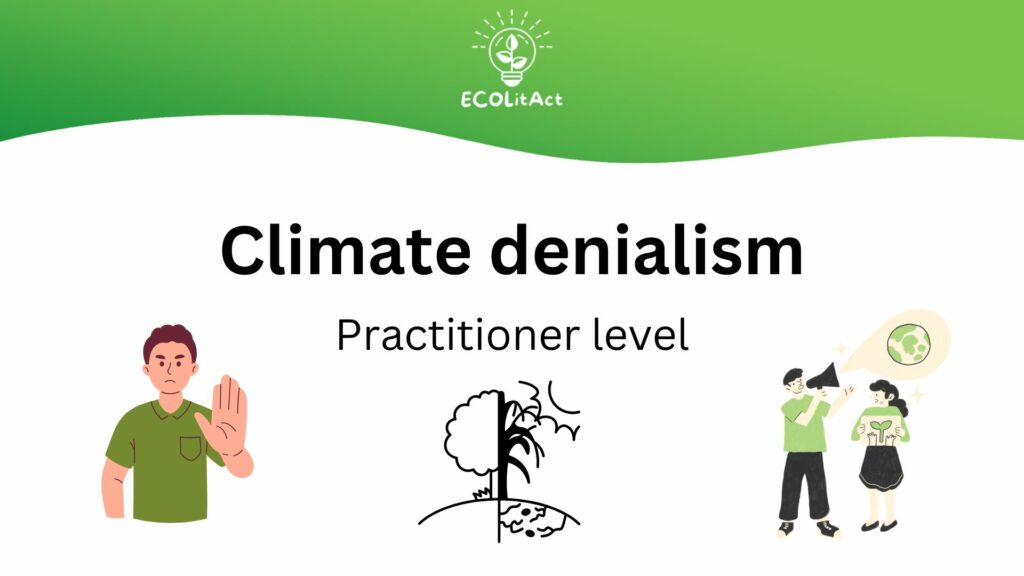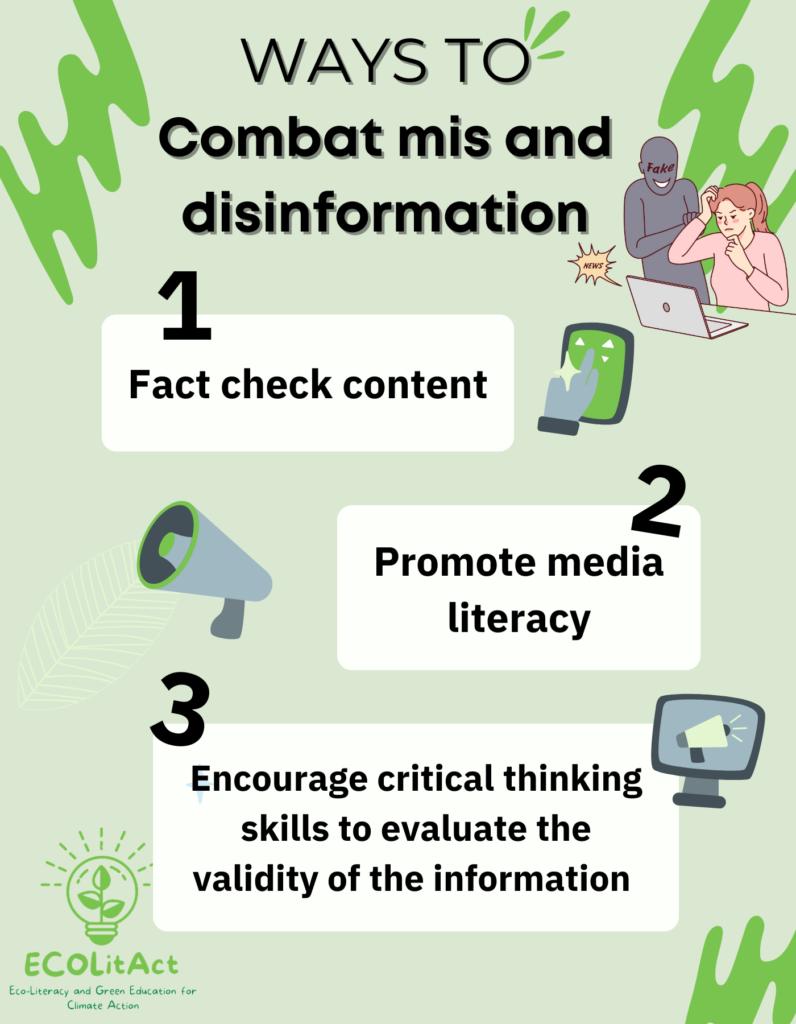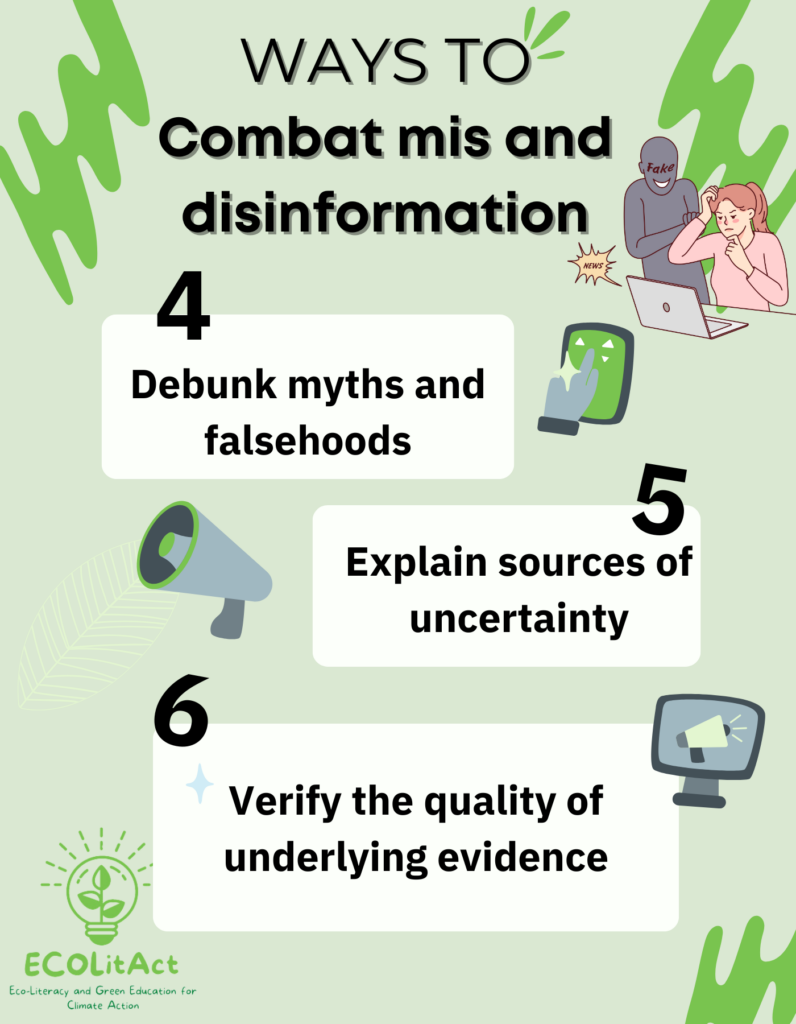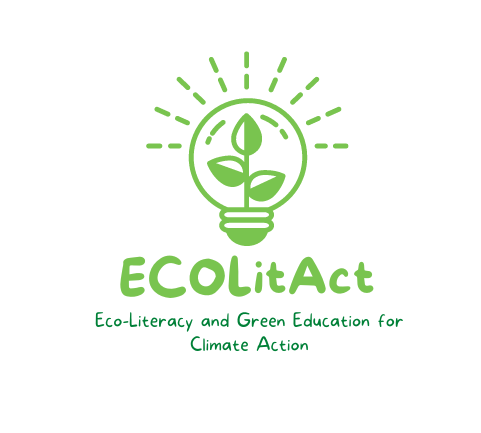Learning objectives | Introduction: Engaging previous knowledge | Scenario: Investigative journalism on climate misinformation | Quiz: Climate change misconceptions debunked | Reflecting on key points: Why is it important to debunk climate change claims based on common misconceptions? | Case studies: Recognizing and combating climate misinformation | Final exercise: Develop you own Action Plan to counter misinformation about climate change! | Final quiz | Europass

In this module, you will explore how climate misinformation spreads, learn to fact-check news, and develop strategies to identify and counter false narratives. Through interactive activities, case studies, and a final action plan, you will strengthen your critical thinking skills and become more informed about reliable climate information.
Learning Objectives
By the end of this lesson, you will be able to:
✅ Develop critical thinking on environmental issues.
✅Identify and fact-check misleading climate news.
✅Seek out and verify credible sources of information.
✅Cross-check the reliability of online content.
✅Recognize and challenge misinformation and propaganda.
Course duration: approximately 2 hours.
By completing this module, you will be equipped to navigate climate discussions with confidence and contribute to spreading truth in environmental communication. 🌍🔍
Introduction: Engaging previous knowledge
How much do you know about the different types of fake news – disinformation, misinformation, and propaganda?
If you are not aware of the precise definitions, then this course is perfect for you!
Let´s go through the different definitions together:
Don’´t worry, we are going to go through practical examples during this course!
Scenario: Investigative journalism on climate misinformation
Take a look at the presentation below. Click through the slides to find instructions for this learning scenario and the scenario materials.
Interactive Activity: Climate change misconceptions debunked
Having learned about how to combat mis- and disinformation on social media, it’s time to put your critical skills into practice. As mis- and disinformation continues to spread across social media platforms, they create confusion and hinder collective action.
This activity aims to debunk some of the most prevalent misinformation surrounding climate change. Your task is to click on the cards and guess whether the claim comes from a climate scientist or a climate denier.
Reflecting on key points: Why is it important to debunk climate change claims based on common misconceptions?
If you are curious to learn more, read the following article to get a good overview of the background of climate change facts: 11 Interesting Climate Change Facts (earth.org)
Case studies: Recognizing and combating climate misinformation
Now that you are familiar with the key concepts of misinformation, disinformation, and propaganda in climate communication, it’s time to explore real-world examples.
Below, you will find a selection of videos that analyse different aspects of climate misinformation—from corporate greenwashing to the psychology behind climate denial. These case studies will help you recognize common tactics used to spread misleading narratives and strengthen your ability to fact-check climate-related claims.
Optional exercise
As you watch the videos, consider the following questions to gather insights for your final task:
- What misinformation techniques are being used in each case?
- Who benefits from spreading these misleading claims?
- How do experts and fact-checkers debunk these arguments?
- What psychological or social factors contribute to the spread of climate misinformation?
- How can you apply these insights to your own analysis of climate-related content?
Videos to explore:
How to Use These Case Studies
You are encouraged to take notes while watching and reflect on key takeaways. These insights can be valuable for your final task, where you will analyse and cross-check climate-related information. While this exercise is optional, it will help you build a stronger foundation in recognizing and debunking climate misinformation.
Let’s uncover the truth behind climate narratives together! 🌍🔍
Through years of research on the topic, researchers have identified several ingredients for trustworthy science communication. These include debunking myths and falsehoods, reliably informing people (don’t persuade), offering balance but not false balance (highlight the weight of evidence or scientific consensus), verifying the quality of the underlying evidence, and explaining sources of uncertainty.


Source: as edited and adopted by Climate change misinformation fools too many people – but there are ways to combat it
Final exercise: Develop your own Action Plan to counter misinformation about climate change!
Take a look at the slides below: Based on the scenario presented here you will develop an action plan to counter climate change misinformation.
Below the slides you can find more detailed instructions on how to develop an action plan.
Step 1 – Conduct research
Use the internet to explore solutions for combating climate misinformation. Look for strategies used by scientists, journalists, fact-checkers, and organizations working in this field. Use the additional resources provided to guide your research.
Step 2 – Organize your findings
Use the table provided in the slides above as a template to structure your action plan.
Step 3 – Develop your action plan
Based on your findings, outline practical steps to counter misinformation. Your plan can include actions such as:
🔹 Fact-checking and verifying sources.
🔹 Raising awareness through social media or community initiatives.
🔹 Promoting credible climate science and expert voices.
🔹 Identifying and debunking misinformation techniques.
🔹 Encouraging responsible communication and media literacy.
Step 4 – Present your findings
Choose a presentation format to share your Action Plan. You can create:
📌 A PowerPoint/Google Slides presentation.
📌 A written report.
📌 An infographic.
📌 A video or multimedia project.
Final goal
By the end of this activity, you will have a personalized Action Plan that outlines how you can actively contribute to fighting climate misinformation. Whether through social media, community engagement, or educational efforts, your plan will serve as a roadmap to promote truth and scientific literacy in climate discussions.
Let’s work together to ensure accurate and reliable climate information is shared! 🌍💡
Final quiz
Quiz: Identifying and Combating Climate Misinformation. Answer this multiple choice quiz to finalize this course and get your certificate.
Good Job!
You’re now finished with the Practitioner level lesson on climate denialism!
If you would like to learn more about climate denialism and read the extra resources, please check the Expert level lesson of climate denialism.
Showcase your new skills with Europass
You have just completed another step in your learning journey. The skills and knowledge you have gained are valuable – not just for countering climate denialism and contributing to a greener future, but also for opening doors to new opportunities for you! A great way to do this is by adding them to your Europass profile.
Europass is a European Union initiative that helps individuals communicate their skills, qualifications, and experiences clearly and effectively. It consists of several documents, including the Europass CV, which is recognised across Europe and beyond, making it easier for learners to present their qualifications to potential employers or educational institutions.
If you don’t yet have a Europass profile, creating one takes just a few minutes. Get started here. And if you need a little help to set things up, you can take a look at this video tutorial.
For the lesson you have just completed, we encourage you to add the following skills:
- In-depth understanding of climate denialism, its causes, and its societal impact
- Identification and analysis of climate denialism narratives and viewpoints
- Recognition of behaviours contributing to climate denialism in various contexts
- Knowledge of factors behind climate denialism
- Assessment of misinformation’s role in reinforcing climate denialism
- Development of strategies and initiatives to counteract climate denialism
- Critical reflection on personal and societal attitudes toward climate denialism
- Insight into how climate denialism influences daily actions and climate policy
